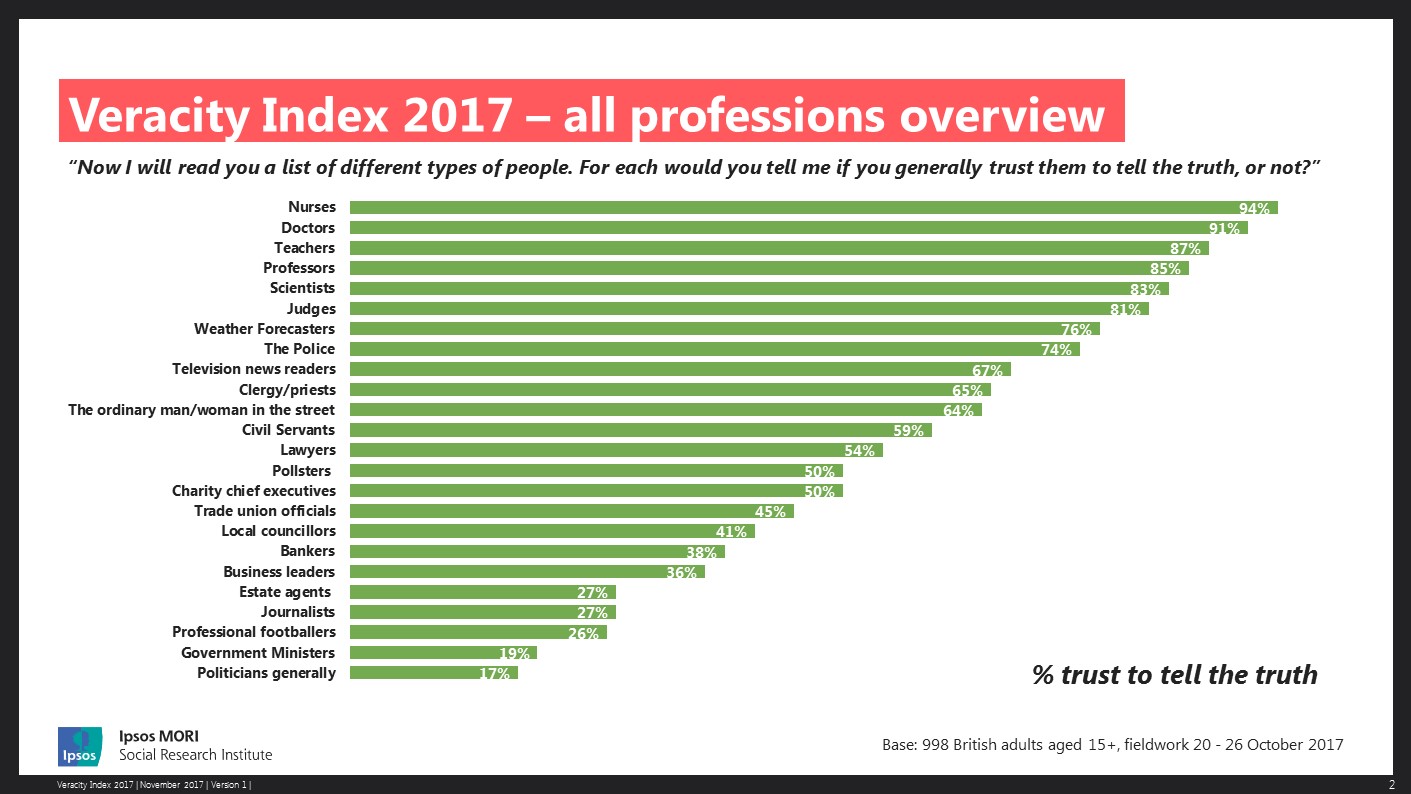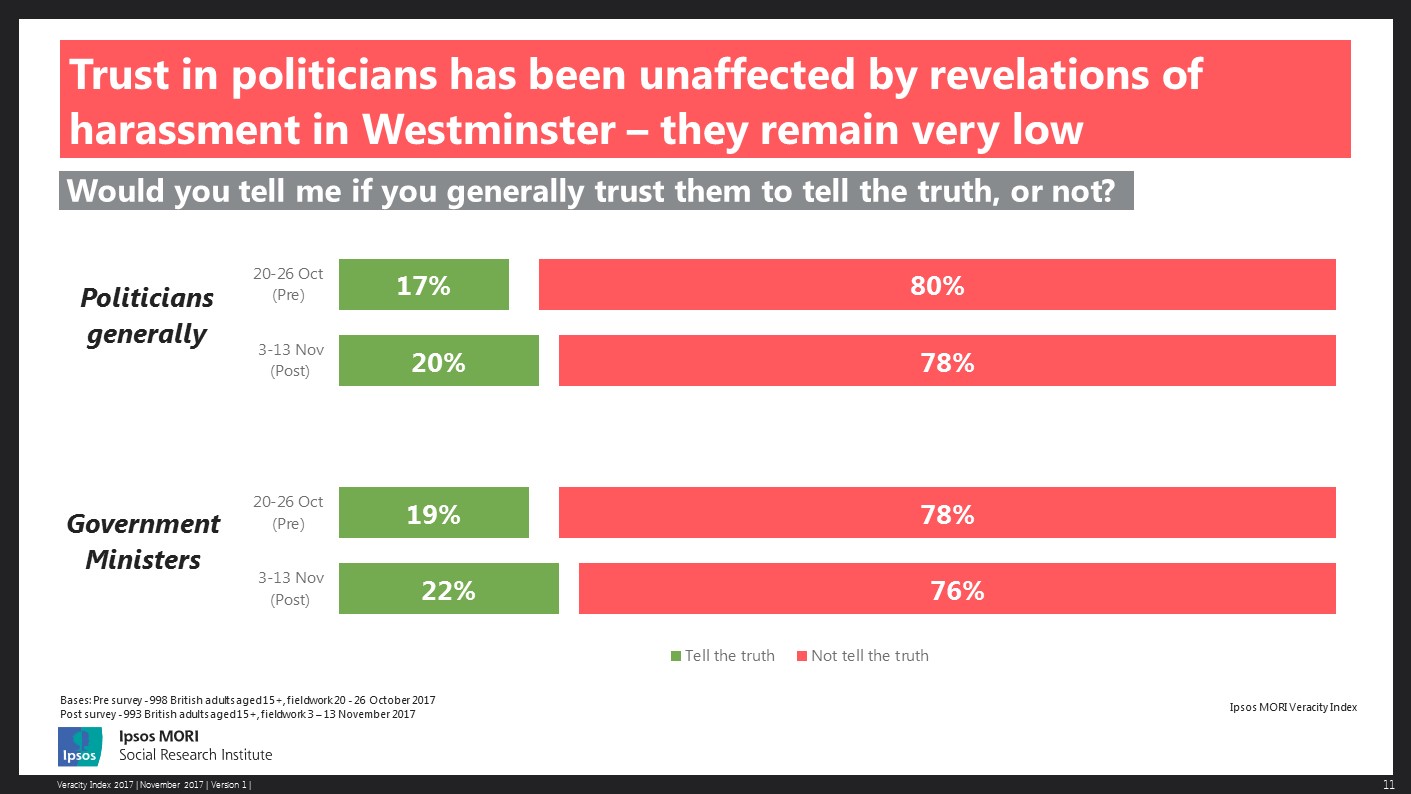Politicians remain the least trusted profession in Britain
Politicians remain the least trusted profession in Britain, but their ratings have been unmoved by recent harassment revelations: Ipsos Veracity Index 2017
The Ipsos Veracity Index is the longest-running poll on trust in professions in Britain, having been asked consistently since 1983. The 2017 edition reveals the esteem the British public holds for a variety of professions, with some fresh additions in the form of weather forecasters and professional footballers. Key headlines include:
- Nurses remain the most trusted profession in Britain. Ninety-four per cent trust them to tell the truth, just ahead of doctors (91%).
- Government Ministers and politicians are again the least trusted; 19% trust Ministers and 17% trust politicians more generally. In a follow-up wave conducted after numerous sexual harassment cases in Parliament came to light, trust was at 22% and 20% - not significantly different to the scores beforehand.
- Three quarters trust weather forecasters to tell the truth (76%), making them the seventh-most trusted profession.
- Trust in the police is at its highest recorded level. At 74%, trust has risen by 13 percentage points since 1983.
- Trust in professors has risen strongly since 2011, when this profession was last included. Eighty-five per cent trust these academics to tell the truth, up from 74% six years ago.
- Faith in priests is now 20 points lower than in 1983, when they were the most trusted profession. This year two thirds (65%) trust them to tell the truth, their lowest recorded level.
- Trust in scientists has equalled the highest recorded level – 83% now trust them to tell the truth, the joint-highest recorded score (it was previously this high in 2014). The proportion trusting scientists has risen 20 percentage points since 1997.
- Professional footballers are trusted by just a quarter of the public (26%), putting them on a par with estate agents (27%).
- Trust in journalists – while low – is also at a record high. 27% of the public trust them to tell the truth, the highest score since the survey began.
Overall, this year’s trust league table looks similar to 2016, with nurses and doctors at the head and politicians and Government Ministers at the bottom, below journalists, estate agents and professional footballers.

Footballers and Weather Forecasters are new professions for this year of the index:
- Footballers are generally not trusted to tell the truth, with just a quarter (26%) feeling that they are truthful. London is an exception – here 42% say they think professional footballers are trustworthy.
- By contrast, three quarters think weather forecasters are trustworthy (76%), giving them a far better ranking than pollsters (50%), the other predicting profession in our list. People who are especially likely to trust weather forecasters include broadsheet newspaper readers (92%), those with a degree (88%), and those living in rural areas (82%).
The professions in the poll fall into two groups: one for whom there is a strong gradient of trust by educational level, with those with fewer qualifications being less trusting; and another where educational attainment is not associated with different views. The former includes for a wide range of “expert” professions, including judges, pollsters, civil servants, doctors and scientists, as well as weather forecasters, with a gap of 21 percentage points in trust between those holding degrees (88% trust) and those with no formal qualifications (67%). The latter group includes lawyers, clergy, bankers and nurses.
As the main Veracity Index was conducted a week before news broke about revelations of sexual harassment at Westminster, a second wave of the survey was run to measure the impact these stories might have on the perception of truthfulness among these professions.

There were no significant differences in the level of trust recorded between the two waves, suggesting either that politicians’ reputation for truthfulness is not related to perceptions of any moral misdemeanours, or that public trust in this profession has reached a floor and is unable to sink lower:
| Government Ministers | Politicians |
% Trust to tell the truth (Pre wave – 20-26 October) | 19% | 17% |
% Trust to tell the truth (Post wave – 3-13 November) | 22% | 20% |
Gideon Skinner, head of political polling at Ipsos, said:
Ipsos has been tracking trust in professions for over 30 years, and over that time there have been some notable movers. Groups such as professors, scientists, the police, trade union officials and civil servants have become more trusted, but the clergy are the most notable losers. But not everything changes – doctors, nurses and teachers have consistently been near the top, and politicians and journalists down the bottom. Trust in journalists does show signs of improvement, but even the recent harassment scandals at Westminster seemed to make little difference to low ratings in politicians as a class – either because it has already hit a floor, or because the public felt it reflected other aspects of trust such as moral behaviour more than their ability to tell the truth.
Another notable finding is the difference between education levels and trust in many – but not all – professions, reflecting many other differences in views between these groups. Graduates tend to have higher levels of trust both in a range of “expert” groups such as weather forecasters, judges, civil servants and scientists, but also in journalists and the ordinary person on the street.
Technical note:
Ipsos interviewed a representative quota sample of 998 adults aged 15+ across Great Britain. Interviews were conducted face-to-face between 20 and 26 October 2017. Data is weighted to match the profile of the population.
For the follow-up survey, 993 adults aged 15+ were interviewed across Great Britain. Just two professions were carried on this wave; politicians generally and Government Ministers. Interviews were conducted face-to-face between 3 and 14 November 2017, and data was weighted to match the profile of the population.




